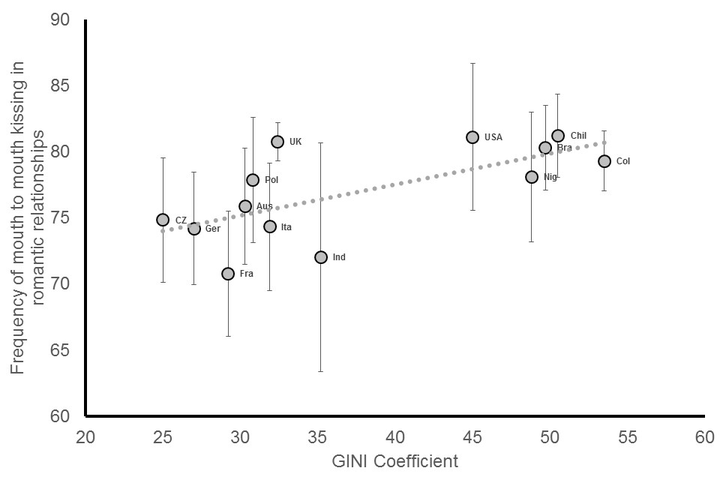National income inequality predicts cultural variation in mouth to mouth kissing

Abstract
Romantic mouth-to-mouth kissing is culturally widespread, although not a human universal, and may play a functional role in assessing partner health and maintaining long-term pair bonds. Use and appreciation of kissing may therefore vary according to whether the environment places a premium on good health and partner investment. Here, we test for cultural variation (13 countries from six continents) in these behaviours/attitudes according to national health (historical pathogen prevalence) and both absolute (GDP) and relative wealth (GINI). Our data reveal that kissing is valued more in established relationships than it is valued during courtship. Also, consistent with the pair bonding hypothesis of the function of romantic kissing, relative poverty (income inequality) predicts frequency of kissing across romantic relationships. When aggregated, the predicted relationship between income inequality and kissing frequency (r=.67, BCa 95%CI[.32,.89]) was over five times the size of the null correlations between income inequality and frequency of hugging/cuddling and sex. As social complexity requires monitoring resource competition among large groups and predicts kissing prevalence in remote societies, this gesture may be important in the maintenance of long-term pair bonds in specific environments.
Ig Nobel Prize:
Happily, we were awarded the 2020 Ig Nobel Prize in economics for this project, “for trying to quantify the relationship between different countries’ national income inequality and the average amount of mouth-to-mouth kissing”. Below, you can watch the ceremony (if you want to jump to Chris receiving the prize, go to 28:13).
Here is the Ig Informal Lecture by the winners of the 2020 Ig Nobel Economics Prize.